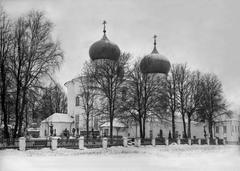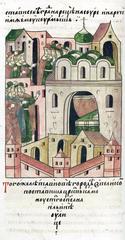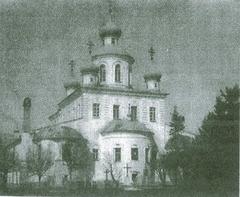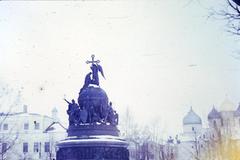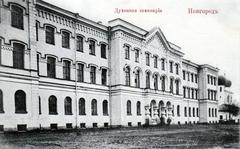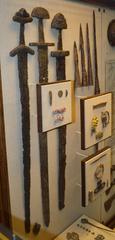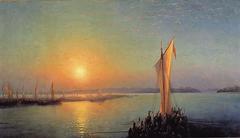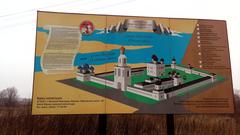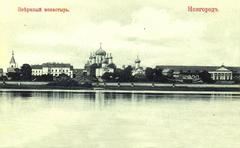Guide to Visiting памятник Александру Невскому in Veliky Novgorod, Russia
Date: 25/07/2024
Introduction
The Alexander Nevsky Monument in Veliky Novgorod, Russia, stands as a testament to one of the nation’s most revered historical figures. Alexander Nevsky, born in 1221, was a prince celebrated for his military prowess and diplomatic acumen. His victories over the Teutonic Knights and the Swedes in the 13th century solidified his reputation as a formidable leader and protector of Russian lands. The monument, erected to honor his contributions, is not only a significant historical landmark but also a cultural icon that attracts numerous visitors each year. This guide aims to provide comprehensive information on the history, architectural details, cultural significance, and practical tips for visiting the Alexander Nevsky Monument, ensuring a rich and educational experience for all. For more detailed information on the monument and other attractions in Veliky Novgorod, visitors can explore resources like Novgorod.ru and Visit Russia.
Table of Contents
- [History of the Monument](#history-of-the-monumenthistory-of-the-monument)
- [Origins and Construction](#origins-and-constructionorigins-and-construction)
- [Design and Symbolism](#design-and-symbolismdesign-and-symbolism)
- [Historical Context](#historical-contexthistorical-context)
- [Restoration and Preservation](#restoration-and-preservationrestoration-and-preservation)
- [Cultural Significance](#cultural-significancecultural-significance)
- [Visitor Information](#visitor-informationvisitor-information)
- [Visiting Hours and Tickets](#visiting-hours-and-ticketsvisiting-hours-and-tickets)
- [Travel Tips](#travel-tipstravel-tips)
- [Nearby Attractions](#nearby-attractionsnearby-attractions)
- [FAQ](#faqfaq)
- [Conclusion](#conclusionconclusion)
- [References](#referencesreferences)
History of the Monument
Origins and Construction
The monument to Alexander Nevsky in Veliky Novgorod is a significant historical and cultural landmark. Alexander Nevsky, a revered Russian prince and military leader, is celebrated for his victories over the Teutonic Knights and the Swedes in the 13th century. His legacy is deeply intertwined with the history of Veliky Novgorod, where he once ruled and defended the city from foreign invaders.
The monument was erected to honor Alexander Nevsky’s contributions to Russian history and his role in safeguarding the nation’s sovereignty. The decision to build the monument was influenced by the desire to commemorate his military achievements and his canonization as a saint by the Russian Orthodox Church.
Design and Symbolism
The design of the monument is a testament to the artistic and architectural prowess of its creators. The statue of Alexander Nevsky stands tall, exuding a sense of strength and determination. He is depicted in full armor, holding a sword and shield, symbolizing his role as a protector of the Russian land. The monument’s base is adorned with intricate carvings and inscriptions that narrate key events from Nevsky’s life and his military campaigns.
The monument’s location in Veliky Novgorod is also symbolic. It stands in a prominent public space, serving as a constant reminder of Nevsky’s legacy and the city’s historical significance. The choice of Veliky Novgorod as the site for the monument underscores the city’s importance in Russian history and its connection to Alexander Nevsky.
Historical Context
Alexander Nevsky’s historical context is crucial to understanding the monument’s significance. Born in 1221, Nevsky rose to prominence during a tumultuous period in Russian history. The Mongol invasion had devastated much of the Russian principalities, and foreign threats loomed large. Nevsky’s military acumen and diplomatic skills were instrumental in navigating these challenges.
His victory at the Battle of the Ice in 1242, where he defeated the Teutonic Knights on the frozen Lake Peipus, is one of his most celebrated achievements. This battle not only secured Novgorod’s independence but also solidified Nevsky’s reputation as a formidable leader. His subsequent victories against the Swedes further cemented his status as a national hero.
Restoration and Preservation
The monument to Alexander Nevsky has undergone several restoration efforts to preserve its historical and cultural value. During World War II, Veliky Novgorod suffered significant damage, and many historical monuments, including the Alexander Nevsky statue, were at risk. The monument was dismantled by the Nazis and prepared for transportation to Germany, but fortunately, this plan was never realized (Novgorod.ru).
After the city’s liberation, the monument was meticulously restored and unveiled to the public in November 1944. This restoration effort was part of a broader initiative to rebuild and preserve Veliky Novgorod’s historical heritage, which had been severely impacted by the war.
Cultural Significance
The monument to Alexander Nevsky holds immense cultural significance for Veliky Novgorod and Russia as a whole. It serves as a symbol of national pride and resilience, commemorating a leader who played a pivotal role in shaping Russian history. The monument is a focal point for various cultural and historical events, including ceremonies and commemorations that celebrate Nevsky’s legacy.
The monument also attracts numerous visitors, both from within Russia and abroad, who come to pay homage to Alexander Nevsky and learn about his contributions to Russian history. It is an essential part of the cultural landscape of Veliky Novgorod, reflecting the city’s rich historical heritage and its enduring connection to one of Russia’s most revered figures.
Visitor Information
Visiting Hours and Tickets
For visitors to Veliky Novgorod, the monument to Alexander Nevsky is a must-see attraction. The monument is accessible year-round, with the best visiting hours being from 9 AM to 8 PM. There is no admission fee to view the monument, making it an accessible landmark for all.
Travel Tips
When planning a visit to the monument, it is advisable to check the local weather conditions and dress accordingly, as the monument is an outdoor attraction. The best time to visit is during the summer months, when the weather is pleasant, and the surrounding gardens are in full bloom. However, each season offers a unique perspective on its beauty and significance.
Visitors can take guided tours that provide detailed insights into the life and achievements of Alexander Nevsky, as well as the historical context of the monument. These tours often include multilingual guides and can be arranged through local tourist offices or online booking platforms.
Nearby Attractions
The surrounding area offers a picturesque setting, with well-maintained gardens and pathways that enhance the visitor experience. The monument’s location also provides easy access to other historical landmarks in Veliky Novgorod. Visitors should consider exploring other nearby attractions, such as the Novgorod Kremlin, St. Sophia Cathedral, and the Vitoslavlitsy Museum of Wooden Architecture. These sites provide a deeper understanding of Veliky Novgorod’s historical and cultural context and complement the experience of visiting the Alexander Nevsky monument (Visit Novgorod).
FAQ
What are the opening hours for the Alexander Nevsky Monument?
The monument is accessible year-round, with the best visiting hours being from 9 AM to 8 PM.
How much are tickets for the Alexander Nevsky Monument?
There is no admission fee to view the monument.
Are guided tours available at the Alexander Nevsky Monument?
Yes, guided tours are available and can be arranged through local tourist offices or online booking platforms.
Conclusion
In conclusion, the Alexander Nevsky Monument in Veliky Novgorod is more than just a statue; it is a symbol of Russian history, culture, and resilience. Erected to honor one of Russia’s greatest heroes, the monument provides a meaningful and educational experience for visitors. From its intricate design and rich historical context to the various cultural events held in its honor, the monument offers a deep connection to Russia’s past. Whether you’re a history enthusiast, a cultural explorer, or simply a curious traveler, visiting this landmark will undoubtedly enrich your understanding of Russian heritage. For the latest updates and more information, consider downloading the mobile app Audiala or exploring related posts and social media channels (Visit Novgorod).
